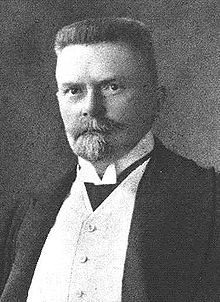Karel Kramář
| Karel Kramář | |
|---|---|
 |
|
| 1st Prime Minister of Czechoslovakia | |
|
In office 14 November 1918 – 8 July 1919 |
|
| Preceded by | Position established |
| Succeeded by | Vlastimil Tusar |
| Personal details | |
| Born |
27 December 1860 Vysoké nad Jizerou, Austrian Empire |
| Died | 26 May 1937 (aged 76) Prague, Czechoslovakia |
| Political party |
Young Czech Party National Democracy National Unification |
| Occupation | Politician |
| Religion | Eastern Orthodox |
Karel Kramář (27 December 1860 – 26 May 1937) was a Czech (Bohemian) politician. During his time as representative in the Austrian-Hungarian Reichstag (Imperial Council) from 1891 to 1915 he was known as Dr. Karl Kramarsch. He was born in Vysoké nad Jizerou, near the northern border of what is now the Czech Republic, into a well to do family. He was very talented and spoke at least half a dozen languages fluently, that allowed him to make many valuable contacts on an international scale all through Europe and even America. He studied law, obtaining a doctor degree. He married a Russian socialite, , establishing many bonds there.
Kramář was born in Vysoké to a wealthy family and was educated at the Universities of Prague, Strasbourg, Berlin and the École des Sciences Politiques in Paris. In the 1880s, Kramář played a prominent role in the agitation against the fact that Charles University in Prague only offered instruction in German, demanding that a Czech language Charles University be established so that Czech university students could be educated in their own language.
He became the leader of the Young Czech Party in Austria-Hungary and later of the National Democratic Party in Czechoslovakia. In 1896, Kramář become the Austrian Minister of Finance. Like other Slavic politicians in the Dual Monarchy, Kramář disliked the Compromise of 1867 that he felt had elevated the Magyars to a position of political power that their numbers did not warrant and wanted the Austrian Empire to abandon its alliance with Germany in favor of an alliance with Russia. Kramář believed that with time and democracy in the form of universal suffrage would transform the Austrian Empire into a Slavic state as the Slavic peoples were the most numerous of the various ethnic groups in the empire. Like many other Young Czechs, Kramář was a Russophile, seeing Russia as the world's only Slavic great power that counterbalanced the dominant ethnic Germans of the Habsburg monarchy. Kramář's wife was a Russian socialite, the daughter of a Moscow industrialist and until 1917 they owned a lavish villa in the Crimea. Kramář was fascinated with Russian culture and loved Russian literature.Tomáš Masaryk often criticized Kramář for the contradiction between his push for universal suffrage and democracy in the Austrian Empire and his support of closer ties with the autocracy of Imperial Russia. The October Manifesto of 1905 was hailed by Kramář as a sign that Russia was liberalizing and would soon become a democratic power in the near-future. In 1908 in Prague, in 1909 in St. Petersburg and in 1910 in Sofia, Kramář attended Pan-Slavic congresses. Along similar pan-Slavic lines, Kramář worked for a "Slavic Bloc" in the Reichsrat that would unite all of the parties representing the Slavic peoples into one bloc against the House of Habsburg. Kramář's pro-Russian inclinations caused much tensions with the ethnic Polish and Ukrainian politicians as both the Poles and the Ukrainians preferred to be part of the Austrian Empire rather than the Russian Empire. Kramář pushed the government to provide greater legal expression of the Czech language, for instance allowing court cases in Bohemia to be conducted in Czech rather than German and for bilingual signs in both German and Czech at Army bases in the "Czech lands" of Bohemia, Moravia and Silesia. Kramář had little love for the House of Habsburg, which as the British historian R.W. Seton-Watson observed that for more than 500 years had showed nothing but "detestation" of the Czech people, but he was willing to accept that the Czechs remain part of the Austrian Empire, provided that the empire was reorganized to give greater autonomy to the "Czech lands" that consisted of the provinces of Bohemia, Moravia, and Silesia.
...
Wikipedia
